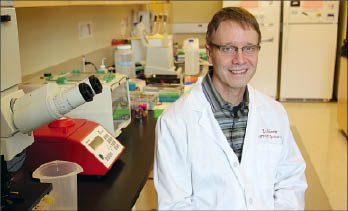
Home » Spokane said to be positioned well for research trend
Spokane said to be positioned well for research trend
Emerging field relies on multidisciplinary teams, which are in place here

February 24, 2011
How much does groundbreaking research matter if a medical community can't get its patients' high blood pressure under control?
It's a rhetorical question, but one Dr. Katherine Tuttle, medical and scientific director of Providence Medical Research Center, asks herself regularly.
"How do we deliver best practices to the community? There's a big gap," Tuttle says. "If we could just deliver what we know now, it would be helpful. It's amazing how little we do with what we know now."
The solution for the U.S. health system—and the opportunity for Spokane's medical-research industry—is in an emerging type of translational research.
Traditionally, translational research has involved taking a basic research discovery and determining how it applies to patient care; this is commonly expressed as taking research from the lab bench to the bedside. However, a related research category, referred to as Type II translational research, is emerging and involves a multidiscipline approach to the science behind delivering best medical practices.
"It's the future for us, but it's not pie in the sky," Tuttle says. "It's here now."
Ken Roberts, director of the WWAMI medical-education program at Washing-ton State University Spokane, says the National Institutes of Health has indicated that it will be funding more translational research in coming years. In the past, research funding efforts focused largely on basic research, but Roberts says the translational research is gaining momentum and becoming more important to research backers, who watch much of the groundbreaking research they support fail to become a part of mainstream medicine.
"They want to see a little more of what they've funded implemented," Roberts says.
The Spokane medical community is well-positioned to perform translational research because it has a broad base of community-medicine expertise and isn't deeply entrenched in academic research like a university hospital is typically.
For example, Tuttle currently is working on a NIH grant application for a translational-research project regarding kidney disease. The federal government is putting an emphasis on kidney disease because it accounts for 35 percent of national health-care costs, despite affecting only 10 percent of the population, she says.
Tuttle is applying for the grant in cooperation with Cindy Corbett, associate professor at the WSU College of Nursing, and Steve Setter, associate professor at the WSU College of Pharmacy. Both colleges are located on the Riverpoint Campus.
Other researchers are assembling teams to apply for this grant and others similar to it, she says, but one advantage the Spokane team might possess, she says, is that the multidisciplinary team already is intact.
"We already were together," she says. "I think there aren't many places that have these existing teams."
Beyond translational research, Roberts says the Spokane medical community will attract more physicians who focus on original research if a new medical building on the Riverpoint Campus comes to fruition later this decade, as expected.
In addition to overseeing the WWAMI program here, Roberts is a Spokane-based molecular biosciences associate professor for the University of Washington. WWAMI stands for Washington, Wyoming, Alaska, Montana, and Idaho, the five states that send students to their first year of medical school at five sites around the region. In their second year, the students attend the UW medical school in Seattle, then receive clinical education in their third and fourth years at locations across the five states.
Through that program, some medical students already come to Spokane to receive instruction for their first, third, and fourth years of medical school. The addition of that second year, however, is essential to building up the medical-research base here.
The addition of second-year medical school instruction would require the school to build up a faculty that not only teaches medicine but also does medically relevant research. Those faculty members potentially could collaborate with physicians and likely would increase the amount of medical research performed in Spokane.
In the meantime, Tuttle says she expects advancements to be made in original research in the Spokane area during the next five to 10 years.
The biggest opportunity for research breakthroughs are in the treatment of chronic diseases, such as diabetes and heart disease. Even AIDS and some forms of cancer are considered chronic diseases now, Tuttle says.
"Many of the things that used to kill quickly are considered chronic now, because doctors have been successful in helping people live with them," she says. "But there's still opportunity to move from chronic diseases to a cure."
Also, Tuttle says she expects more breakthroughs in genomics and related areas.
As importantly, she says, she believes communities in general—not just medical researchers—will need to start addressing social and cultural factors that lead to broad-based medical problems. For example, obesity can lead to a variety of serious medical problems, such as diabetes, but obesity in and of itself typically isn't a medical issue at its root.
"How are communities going to support prevention of root causes of problems like obesity?" Tuttle says. "Are there going to be more sidewalks? Are they going to create environments where healthy food isn't more expensive than Top Ramen? These are questions that are going to be asked in the future."
Latest News
Related Articles




